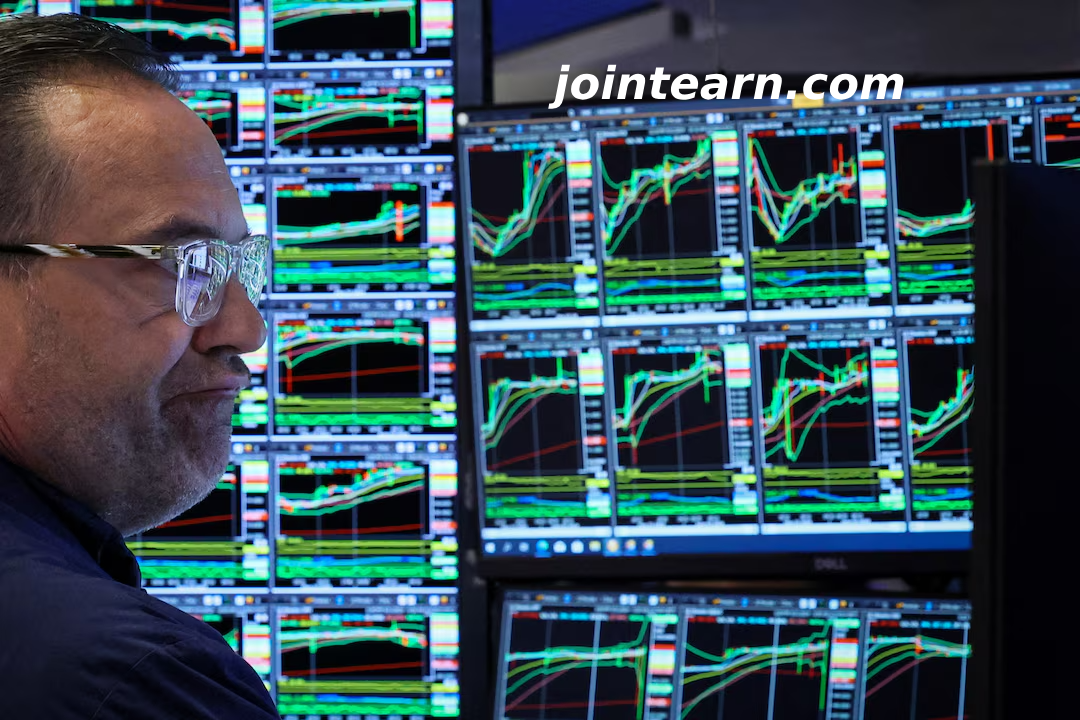A sharp sell-off in global markets eased on Tuesday as European stocks remained stable, following a significant decline in US shares. Investors grew increasingly concerned about the economic impact of President Donald Trump’s tariffs, which fueled Monday’s steep losses in the US markets.
US Markets Plummet Amid Recession Concerns
The US stock market faced a major downturn after Trump acknowledged a “period of transition” in the economy during a televised interview. His remarks, aired on Sunday, raised fears of a potential recession. In response, top Trump officials attempted to reassure investors and ease market anxieties.
On Monday, the S&P 500 fell nearly 3%, while the Dow Jones Industrial Average dropped 2%. The tech-heavy Nasdaq saw the biggest decline, plunging 4%, with Tesla losing 15.4% and Nvidia down over 5%. Other major tech stocks, including Meta, Amazon, and Alphabet, also recorded significant losses.
Asian Markets React Before Stabilizing
Following the US sell-off, Asian stocks initially fell but later recovered. Japan’s Nikkei 225 ended 0.6% lower, while South Korea’s Kospi closed down 1.3%. Meanwhile, the US dollar weakened further against the pound and the euro, continuing its decline from earlier in the month.
European Markets Show Resilience
Despite the turbulence in US and Asian markets, European stocks remained largely stable. The UK’s FTSE 100 dipped slightly by 0.1%, while Germany’s DAX rose 0.4% and France’s CAC 40 gained 0.2%.
Investment strategist Charu Chanana from Saxo Bank noted that the perception of Trump as a “stock market president” is being reassessed. Analysts pointed to investor fears over tariffs and economic uncertainty as key factors driving the market’s volatility.
Investors Weigh Economic Risks
Tim Waterer, chief market analyst at KCM Trade, highlighted growing concerns over Trump’s unpredictable trade policies. “While talk of a recession may be premature, the possibility is enough to push traders into a defensive mindset,” he said.
Ruth Foxe-Blader of Foxe Capital echoed this sentiment, describing Monday’s trading session as “difficult and chaotic” for US markets. She pointed out that investors were not only reacting to Trump’s policies but also reassessing overvalued tech stocks.
Tesla and Tech Stocks Face Mounting Challenges
Tesla’s 15.4% drop reflected growing investor concerns over slowing demand in Europe and China. Investment strategist Lindsay James of Quilter Investors attributed the decline to dwindling orders, increased competition from Chinese electric vehicle manufacturers, and Elon Musk’s political influence on the brand.
White House Attempts to Reassure Investors
After the market turmoil, a White House official dismissed concerns, emphasizing a “strong divergence” between stock market sentiment and actual business performance. White House spokesperson Kush Desai further stated that Trump’s economic policies, including tariffs, had prompted “trillions in investment commitments.”
Long-Term Market Outlook
Despite the recent downturn, economic adviser Kevin Hassett expressed optimism about the US economy. Speaking on CNBC, he insisted that Trump’s trade policies were already benefiting domestic manufacturing and job growth. While acknowledging short-term volatility, Hassett argued that “there are many reasons to be extremely bullish about the economy moving forward.”
Market Sentiment Remains Cautious
Investor sentiment remains fragile as markets weigh the risks of tariffs, economic uncertainty, and shifting political dynamics. As analysts continue to assess the impact of Trump’s policies, traders will closely watch economic indicators and corporate earnings for further market direction.












